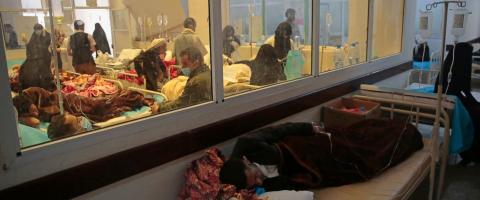What links failed states Syria, Libya, and Yemen?


In the shadow of the Daesh (ISIS) attacks in Paris just a few weeks ago, the UN World Climate Change Conference 2015 opened Monday in the City of Light. And recently, Prince Charles and Bernie Sanders have brought up something that world leaders might want to keep in mind: the link between political instability and climate change.
So your first guess might be that the state failures of Syria, Libya, and Yemen are connected by religion, but instead the answer might be climate change, what Reuters calls, “the key reality of the 21st century.”
This is a theory that's been applied and debated time and again concerning Syria, but in case you've missed out, here's a quick rundown.
In 2006-2009, Syria experienced the worst drought in its modern history. It practically obliterated agriculture, Reuters cites 75 percent of farmers suffered total crop failure. And the movement of around 1.5 million farming families to urban areas placed enormous strain on already packed cities and put pressure on a panicking government, some believe it sowed the seeds of the Daesh we see today.
Libya has a similarly troubled environmental history, as according to the World Bank, approximately 93 percent of the land surface receives less than 100mm of rain per year. The World Bank argues that Libya’s dust storms, sandstorms, floods, and droughts “seriously constrain the country’s development and food security,” which further inflame political instability.
Like Libya, Yemen is vulnerable to desertification, a crippling type of land degradation that makes the land rapidly more arid and obliterates vegetation. And the twin cyclones that slammed the country last month just add to long list of other issues the Yemeni government faces.
Academics are quick to remind us that climate change isn’t the only factor underpinning an uptick in violence in the region, labeling it a “structural threat,” or a catalyst for deterioration. For governments in developing countries, that could mean nations could quickly devolve into failed states, and at its worst, collapse into hot-beds for terrorism if climate change is not addressed soon enough.
So it seems the link between political instability and climate change should definitely be on the agenda in Paris.
By Elizabeth Tarbell

Yemeni officials on Monday condemned arrests and prosecutions by the Iran-backed Houthi militia directed against media, journalists and celebrities…

Yemen's warring parties are gearing up for new waves of conflict in 2023 amid a lack of decisive steps towards sustainable peace, adding to the suf…

The UAE will help to recruit doctors and deliver crucial supplies for hospitals in Yemen under a major healthcare drive. The Khalifa bin…